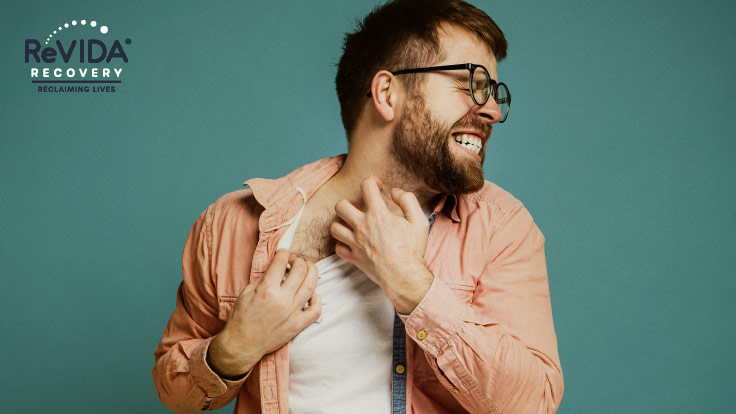
If you or someone you love is managing an opioid addiction, you’re not alone. According to the Addiction Resource Center (ARC), opioid misuse is higher in Appalachia than anywhere else in the nation. If you’re living in a small Appalachian community, finding treatment might feel like a challenge. At ReVIDA® Recovery, we want you to know that no matter where you’re from, we’re here to help.
Opioids are only legal with a prescription for a variety of reasons. Mainly because they can increase your risk of addiction and other health issues. When taken in excess, opioids can also cause uncomfortable side effects. Today, we’re talking about one of those side effects: itching. Why do opioids like heroin make you itch? Let’s talk about it.
Table of Contents
What is Heroin?
According to the Centers for Disease Control (CDC), almost 20% of all opioid overdose deaths are caused by heroin. While it isn’t the strongest opioid (that title goes to fentanyl), it is still powerful – especially when too much of it is taken.
Heroin is an illegal synthetic opioid – it cannot be given by prescription. Usually created in illegal labs, heroin is often smoked or ingested to create feelings of euphoria, well-being, painlessness, and calm. People start taking heroin for a variety of reasons. They may have started with a prescription for other painkillers and migrated to heroin when their doctor wouldn’t prescribe more. Heroin might also be widely available in their area, or their friends/family members might use it. Whatever someone’s reason for taking it, it’s not regulated, which means it isn’t safe.
Recently, heroin has become even more dangerous because it’s being cut with other drugs. Dealers will mix small amounts of fentanyl (a much more powerful opioid) into heroin to make more money and create a potent product. It can also be mixed with things like baking soda or cleaning products, creating additional health risks. Most people who buy heroin don’t know what’s in it, which increases the potential for an overdose and even death.
Heroin also comes with an addiction risk. When taken daily, it increases tolerance, meaning the person taking it will need more to experience the same euphoric effects. If someone has been taking it for a prolonged period, it can also cause unpleasant withdrawal symptoms when it leaves the body. These symptoms cause people to continue taking heroin to avoid discomfort.
If someone you love is taking heroin, they’ll usually have paraphernalia like needles, spoons, tourniquets, and lighters lying around. Their behavior may be off, as well. People who are managing an addiction to heroin usually isolate themselves, act irrationally, or seem irritable. They may also go so far as to steal money or drugs from family or friends to feed their habit. Most of the people who are addicted to heroin do not want to be addicted – it isn’t a choice. There are a number of underlying circumstances, like mental health conditions, that could be contributing to their addiction.
If you are using heroin and you’re unsure of how to stop, seeking treatment in a non-judgemental and compassionate space (like a treatment facility) is highly recommended. It’s never okay to stop taking heroin on your own, as it could be dangerous.
The Causes of “Heroin Itching”
If you’re feeling itchy while taking heroin, it probably isn’t an allergy. The most common reason people feel itchy is an immune system response to the drug. In other words, your body knows that heroin is a foreign chemical and it produces histamines in response. It’s simply your body’s way of trying to protect you.
If you’re injecting heroin, itchiness is also common because of the injection sites. Injection, especially with unclean needles, can cause abscess formations and even skin infections. If this is the case, your skin will be itchy, red, and inflamed. Sometimes, those small injuries become big ones when you pick at them. This can create wounds on your skin. When the wounds are healing, they’ll become itchy.
Skin picking can also happen when you’re going through heroin withdrawals. Withdrawal can cause restlessness and anxiety which can cause you to harm yourself. People who have gone through heroin withdrawals often state that it felt like bugs were crawling under their skin, so they felt like they had to scratch or pick in response. There’s also a mental condition known as Dermatillomania that goes hand-in-hand with heroin use. It can cause you to feel like you’re unable to stop the itching.
Is Scratching Bad? What are the Effects of Itching?
Scratching your skin, especially with heroin in your system, isn’t a good thing. When you’re under the influence of opioids, your pain receptors aren’t doing their job properly. You could be scratching harder than you realize, creating larger wounds.
While skin picking and itching aren’t life-threatening, they can cause your stress levels to rise. They also make you more prone to infection. Feeling constantly itchy could also be a sign that your heroin misuse has progressed. One thing is certain: itching from heroin use is not a sign of good health.
How to Stop Skin Picking and Heal Your Wounds
As long as you’re using heroin, the itching and skin-picking will continue. The only way to stop it from happening is to stop taking heroin – and that isn’t always the easiest thing to do. Finding a treatment center you can trust should be the first step, and we know that isn’t easy. Especially if you’re feeling fearful of being judged or if you feel like you’re beyond help.
At ReVIDA® Recovery, we want you to remember something: if you’re using heroin, your wounds are not just physical. We are ready to help you heal your mind as well as your body. People recover from heroin addiction every day, and we’ve seen it time and time again. This doesn’t have to be permanent; you can reclaim your life from heroin use.
Heroin Addiction Treatment at ReVIDA® Recovery
At ReVIDA® Recovery, we have seen firsthand how effective evidence-based treatment can be in eliminating opioid use disorder (OUD). It doesn’t matter how long you’ve been taking heroin or how impossible it feels to stop right now – recovery is always possible. Let’s talk about some of the treatment options we offer here that could be right for you.
Medication-Assisted Treatment (MAT)
While you’re here for MAT, you’ll be closely monitored by a compassionate and knowledgeable staff. Medications are available that can help in alleviating withdrawal symptoms and guiding you safely into recovery. You’ll also have access to resources that can help you on your journey moving forward, including individual counseling, group counseling, and support groups. In an MAT program, we use medications alongside traditional therapy to guide you away from opioids and into a healthy life of recovery.
You’ll also have the option to move forward with our outpatient treatment program. If a higher level of care is warranted, we will provide referrals for a local inpatient or residential treatment program. Your clinician will go over all of your options to set you up for success.
Buprenorphine (Suboxone®) Treatment
Medication-assisted treatment, or MAT, is a safe and evidence-based way to treat OUD. At ReVIDA® Recovery, we support the use of buprenorphine (Suboxone®) because it has been proven to reduce cravings while working to prevent relapse. To receive buprenorphine (Suboxone®) treatment, you will have to be opioid-free for 24 hours.
Outpatient Rehab Services
We believe that both individual and group therapy are critical components in the treatment of heroin addiction– especially if you’re looking for long-term recovery. This is a safe and supportive space where you will learn how to manage your triggers and create healthy coping mechanisms. Our behavioral healthcare team is composed of licensed therapists, certified counselors, care coordinators, and peer recovery specialists who are standing by and ready to help. If we can treat your addiction where it started, at its roots, your chance of recovery is greater than if we were to simply treat your withdrawal symptoms.
At ReVIDA® Recovery, we’re standing by to help you reclaim your life from black tar heroin. Recovery is possible, and you can start your journey to wellness whenever you’re ready. To learn more or to schedule an appointment, please call us today at 423-631-0432.
FAQs About Why Does Heroin Make You Itch
Is itching a common side effect of heroin?
Yes, itching is a common side effect of regular opioid use, including heroin.
Is itching an allergic reaction to heroin?
Usually, itching does not mean you’re having an allergic reaction to heroin. It usually indicates an immune response or discomfort at the injection site. It can also indicate hallucinations, which can happen during heroin withdrawal.









